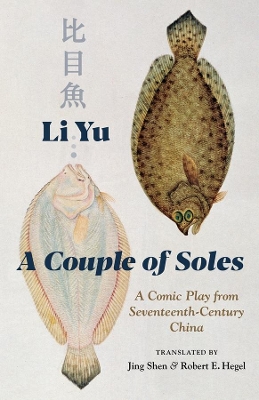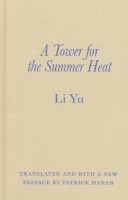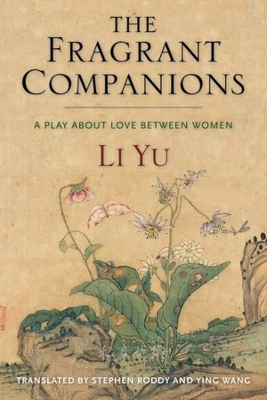Translations from the Asian Classics
3 total works
A Couple of Soles is a classic comedic romance by the seventeenth-century playwright Li Yu. Tan Chuyu, a poor young scholar, falls in love with the beautiful actress Liu Miaogu. He joins her family’s acting troupe, and, in plays within the play, romance ensues. After Liu’s family attempts to marry her off to a local country squire, she performs a famous scene in which a heroine drowns herself—and then jumps off the stage into a river, followed by Tan. The local river deity rescues the lovers from death by transforming them into a pair of soles. Li balances their romance with the adventures of a retired upright official involving banditry, bribery, and mistaken identity—and who nets and shelters the two fish when they regain human form.
Written at a time when China was beginning to recover from the cataclysmic Ming-Qing dynastic transition, A Couple of Soles displays Li’s biting wit as well as his reflections on the concerns of his age, including the dangers of administrative service and the role of theater in society. The play combines witty wordplay and caustic satire with a strong emphasis on traditional moral values. The first major comedy from late imperial China to appear in English translation, A Couple of Soles provides an unparalleled view of the theater in seventeenth-century China. A general introduction and a detailed appendix shed further light on the play and its context.
Written at a time when China was beginning to recover from the cataclysmic Ming-Qing dynastic transition, A Couple of Soles displays Li’s biting wit as well as his reflections on the concerns of his age, including the dangers of administrative service and the role of theater in society. The play combines witty wordplay and caustic satire with a strong emphasis on traditional moral values. The first major comedy from late imperial China to appear in English translation, A Couple of Soles provides an unparalleled view of the theater in seventeenth-century China. A general introduction and a detailed appendix shed further light on the play and its context.
Li Yu, considered a master of comedy in Chinese literature, was a novelist, playwright, and essayist in the 17th century. In this collection, patrick Hanan has translated six of the twelve stories in the Sh'ier lou collection, which is one of the most famous individual collections of vernacular stories from pre-modern China. With Hanan's introduction and notes, and containing Li Yu's emphasis marks, notes, and critiques, this volume should be of interest to students of Chinese literature and general readers alike.
Two young gentry women meet by chance at a nunnery in Yangzhou, where they fall in love at first sight. After they exchange poetry and recognize each other’s literary talents, their emotional bond deepens. They conduct a mock wedding ceremony at the nunnery and hatch a plan to spend the rest of their lives together. Their schemes are stymied by a series of obstacles, but in the end the two women find an unlikely resolution—a ménage-à-trois marriage.
The Fragrant Companions is the most significant work of literature that portrays female same-sex love in the entire premodern Chinese tradition. Written in 1651 by Li Yu, one of the most inventive and irreverent literary figures of seventeenth-century China, this play is at once an unconventional romantic comedy, a barbed satire, and a sympathetic portrayal of love between women. It offers a sensitive portrait of the two women’s passion for each other, depicts their intellectual pursuits and resourcefulness, and celebrates their partial triumph over social convention. At the same time, Li caustically mocks the imperial examination system and deflates the idealized image of the male scholar.
The Fragrant Companions is both an indispensable source for students and scholars of gender and sexuality in premodern China and a compelling work of literature for all readers interested in China’s rich theatrical traditions.
The Fragrant Companions is the most significant work of literature that portrays female same-sex love in the entire premodern Chinese tradition. Written in 1651 by Li Yu, one of the most inventive and irreverent literary figures of seventeenth-century China, this play is at once an unconventional romantic comedy, a barbed satire, and a sympathetic portrayal of love between women. It offers a sensitive portrait of the two women’s passion for each other, depicts their intellectual pursuits and resourcefulness, and celebrates their partial triumph over social convention. At the same time, Li caustically mocks the imperial examination system and deflates the idealized image of the male scholar.
The Fragrant Companions is both an indispensable source for students and scholars of gender and sexuality in premodern China and a compelling work of literature for all readers interested in China’s rich theatrical traditions.


